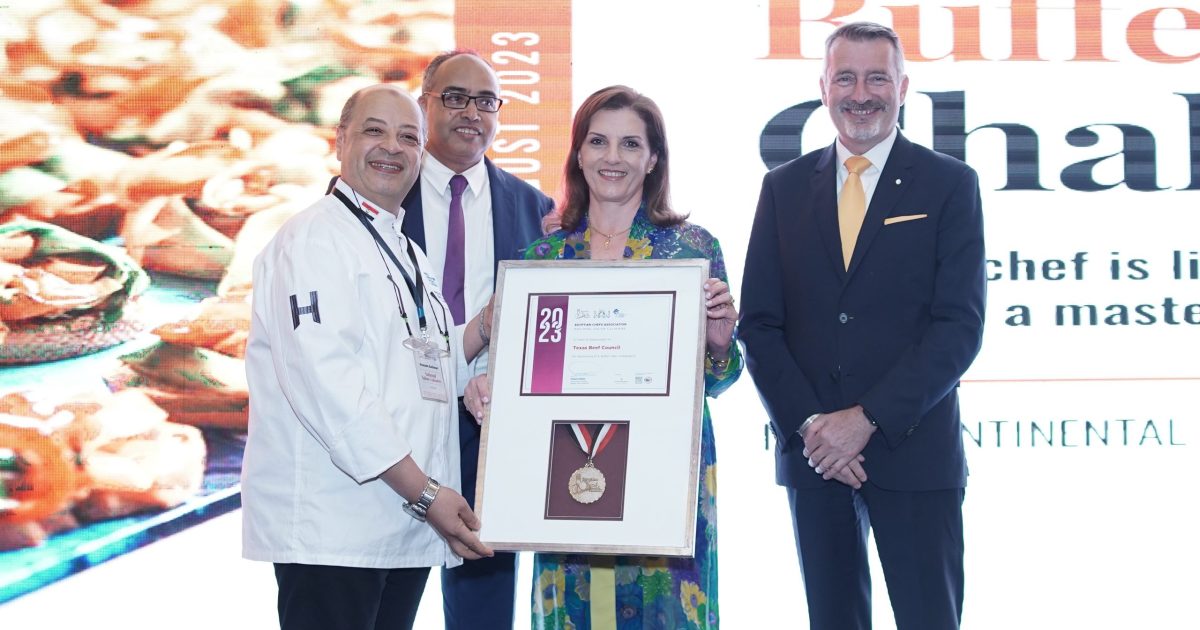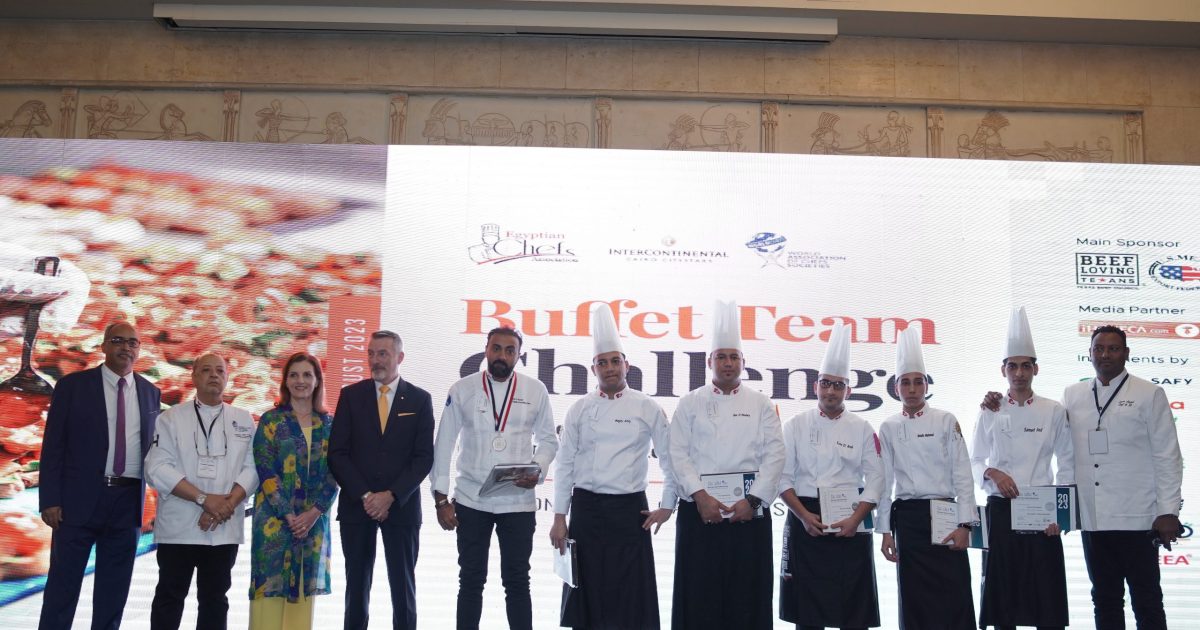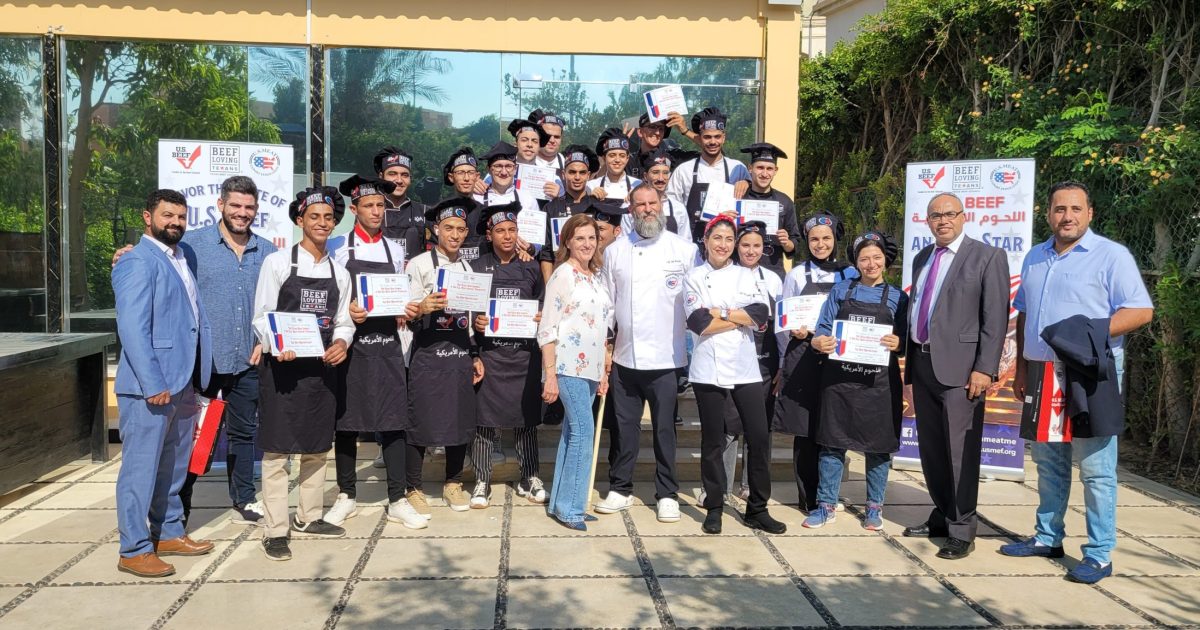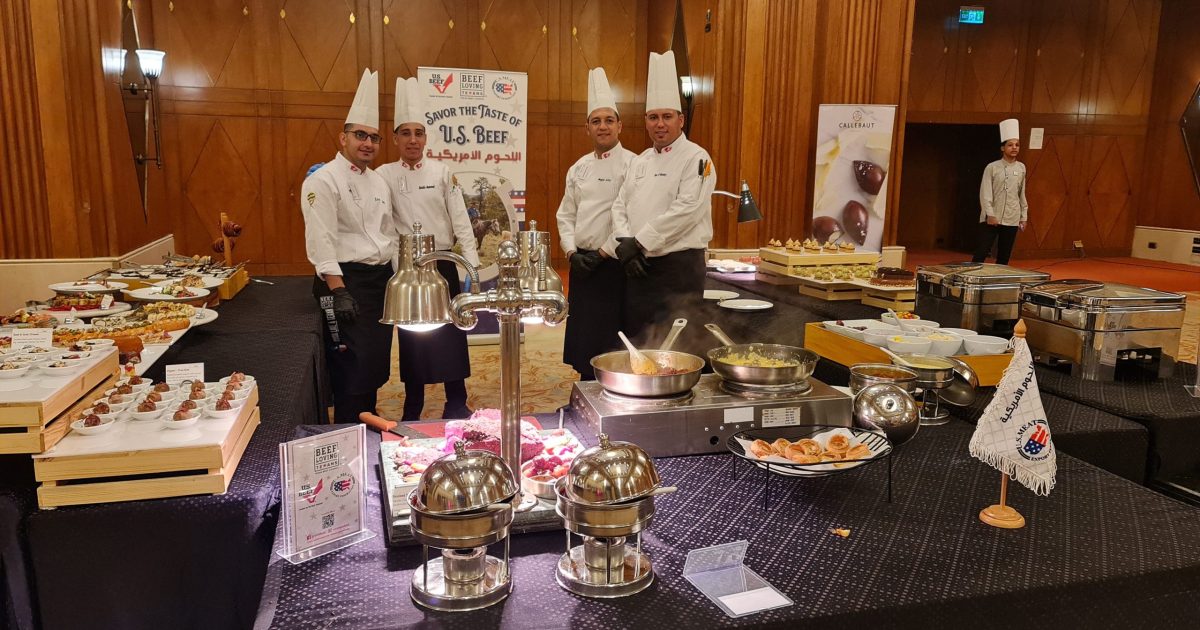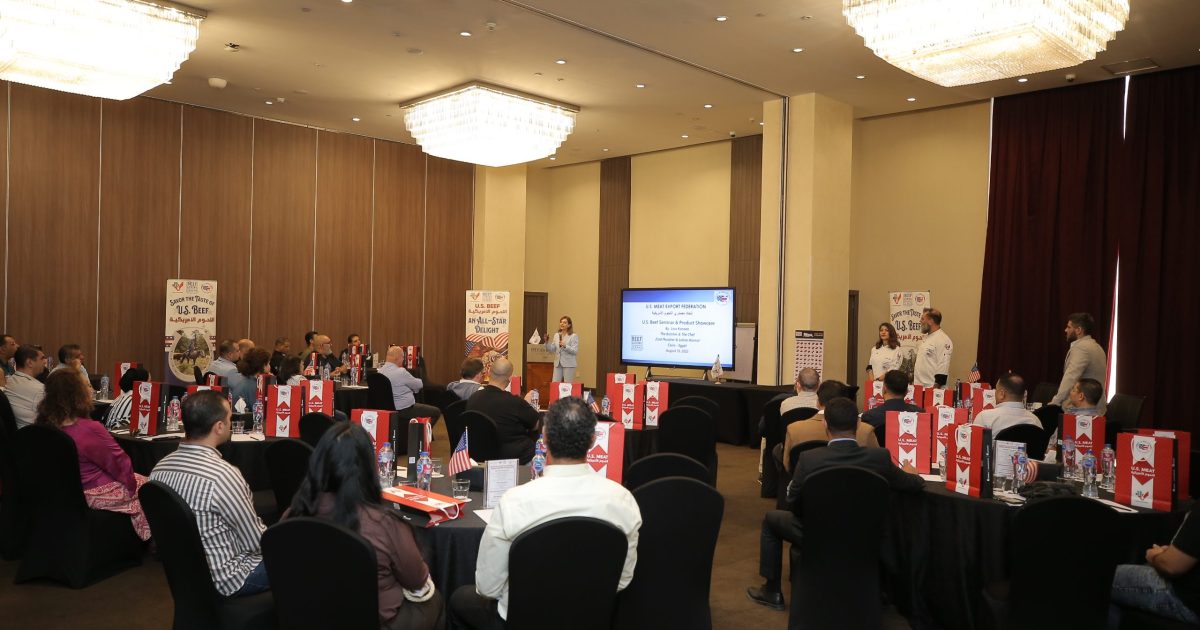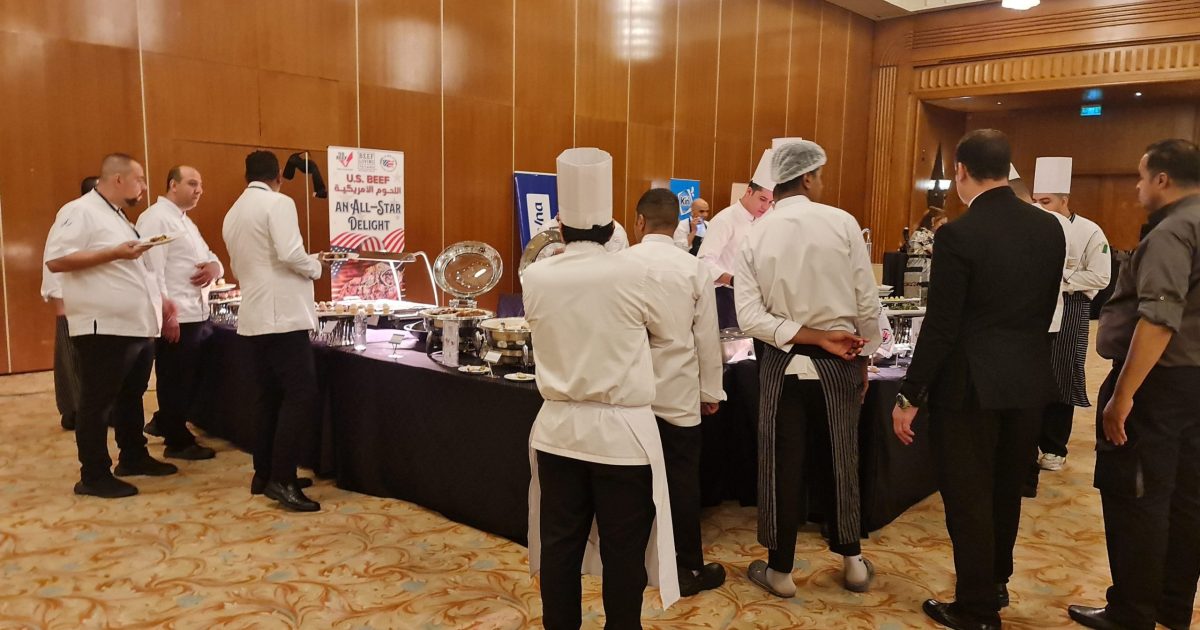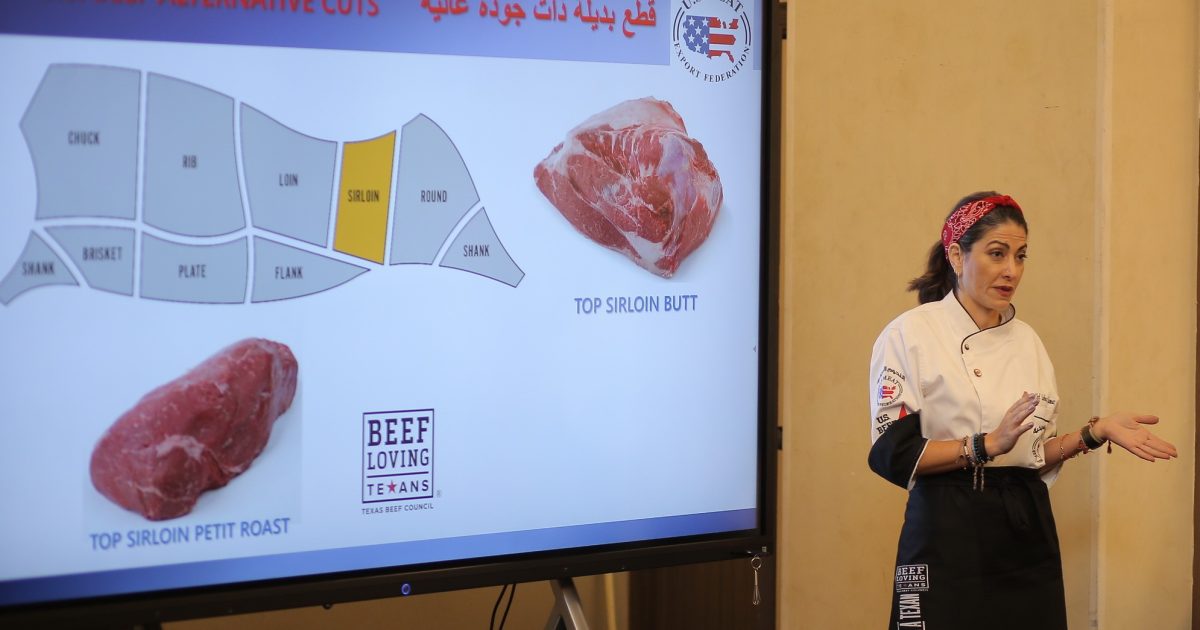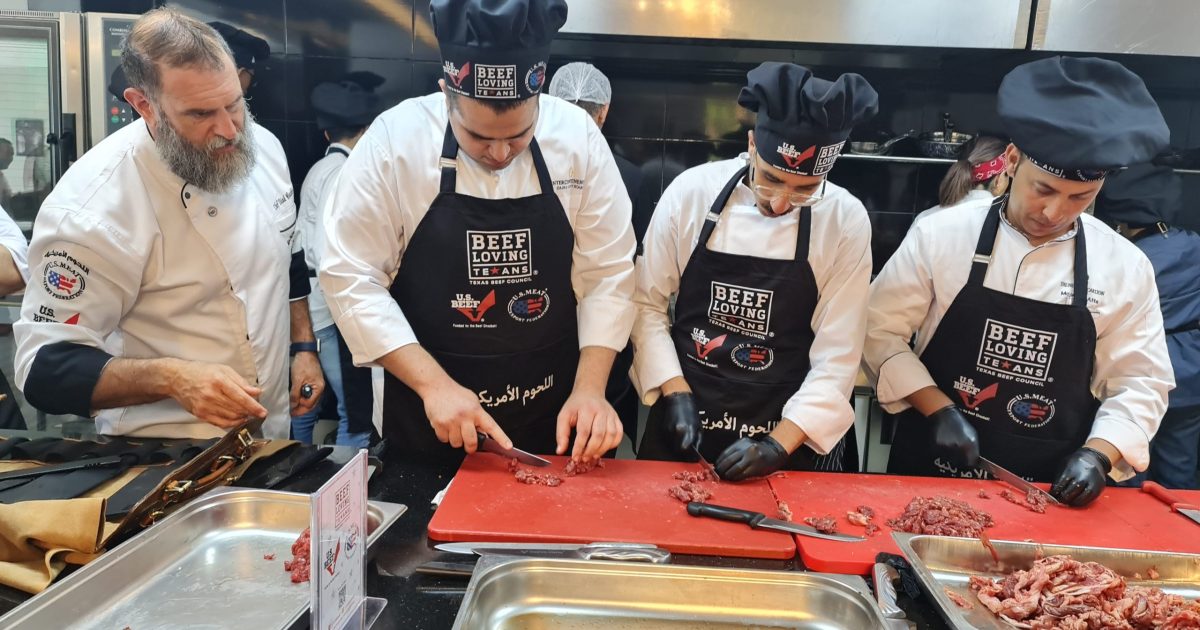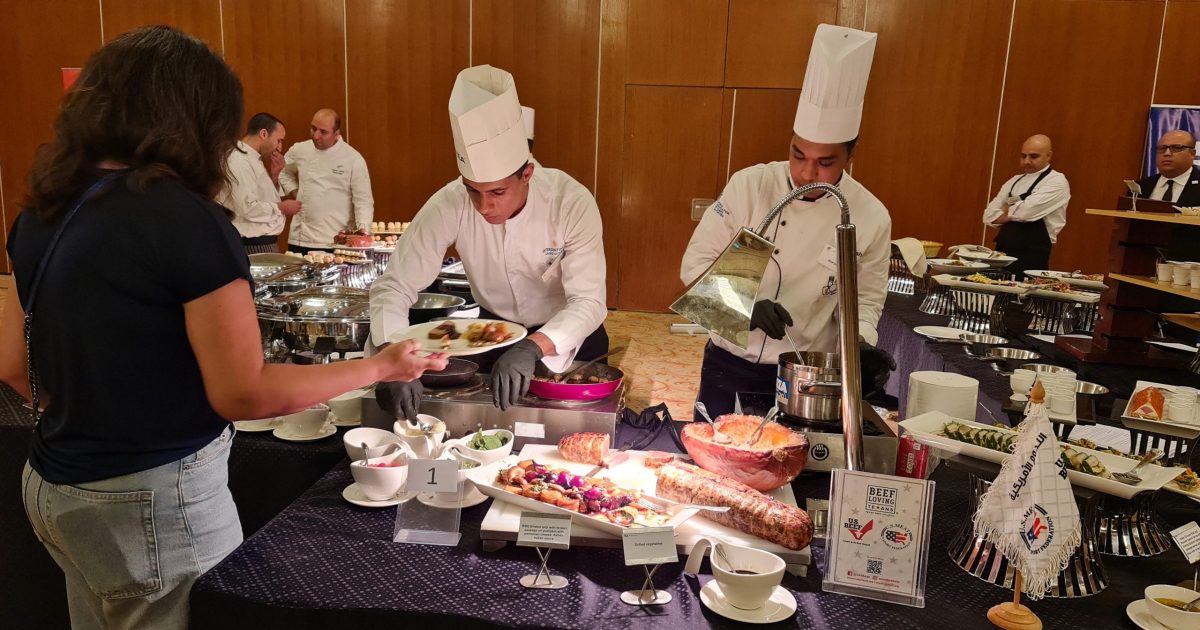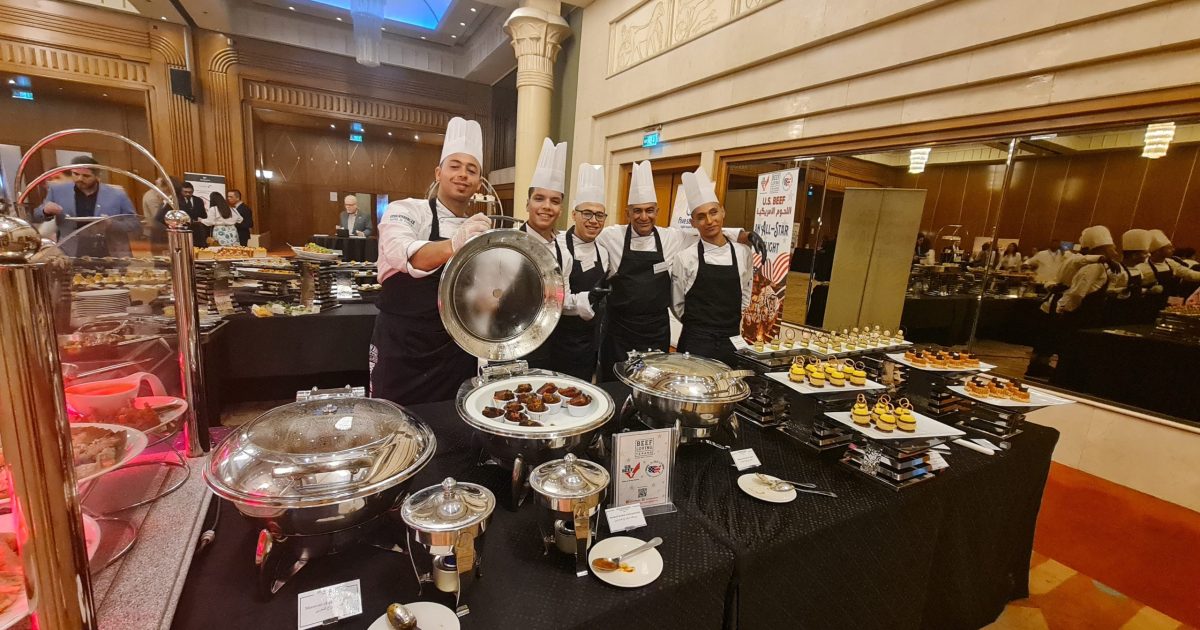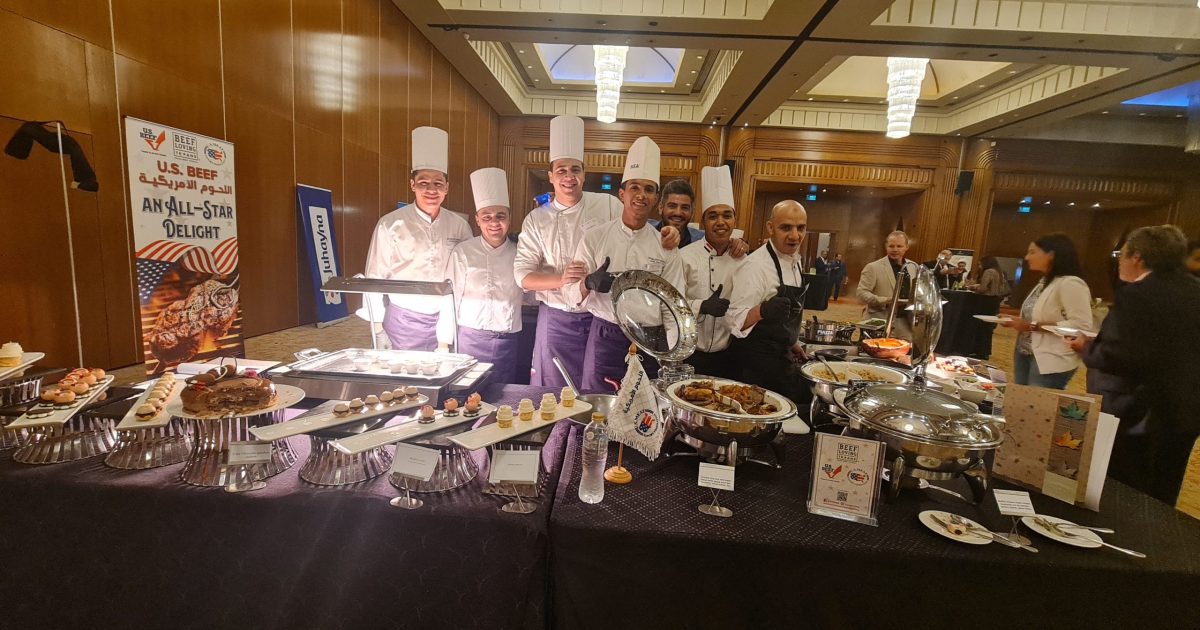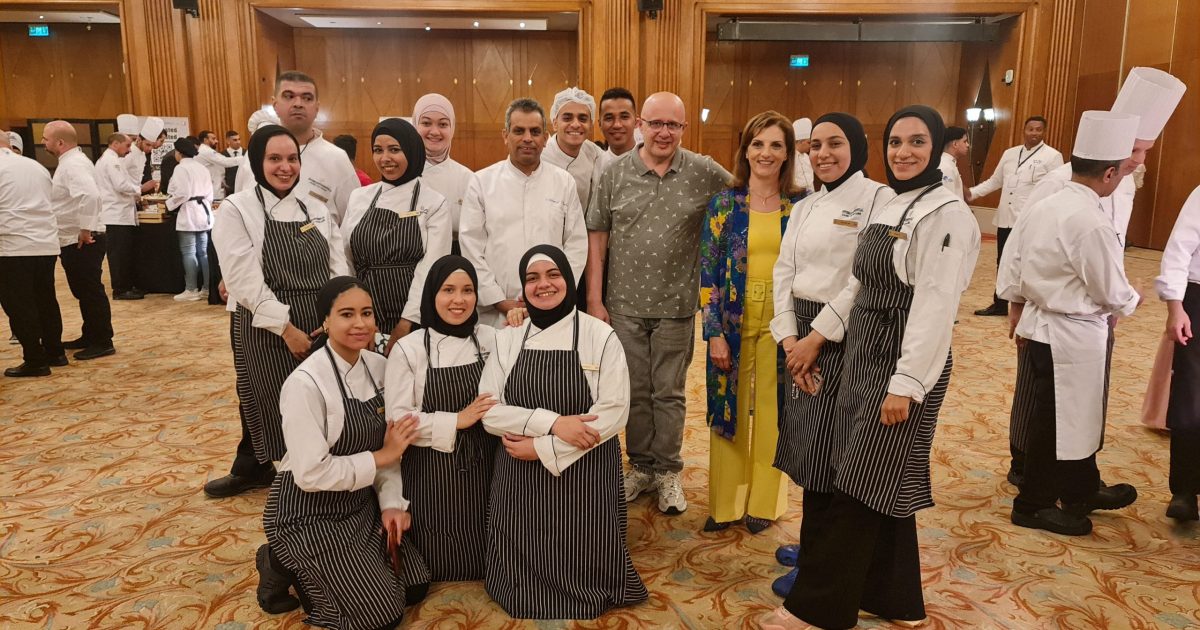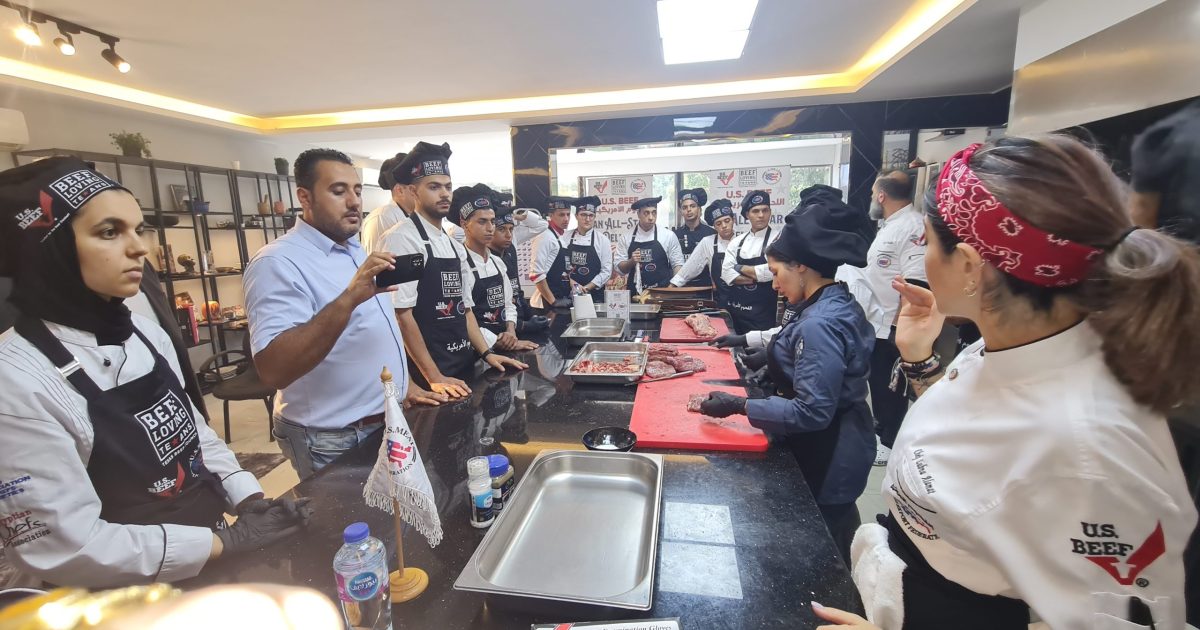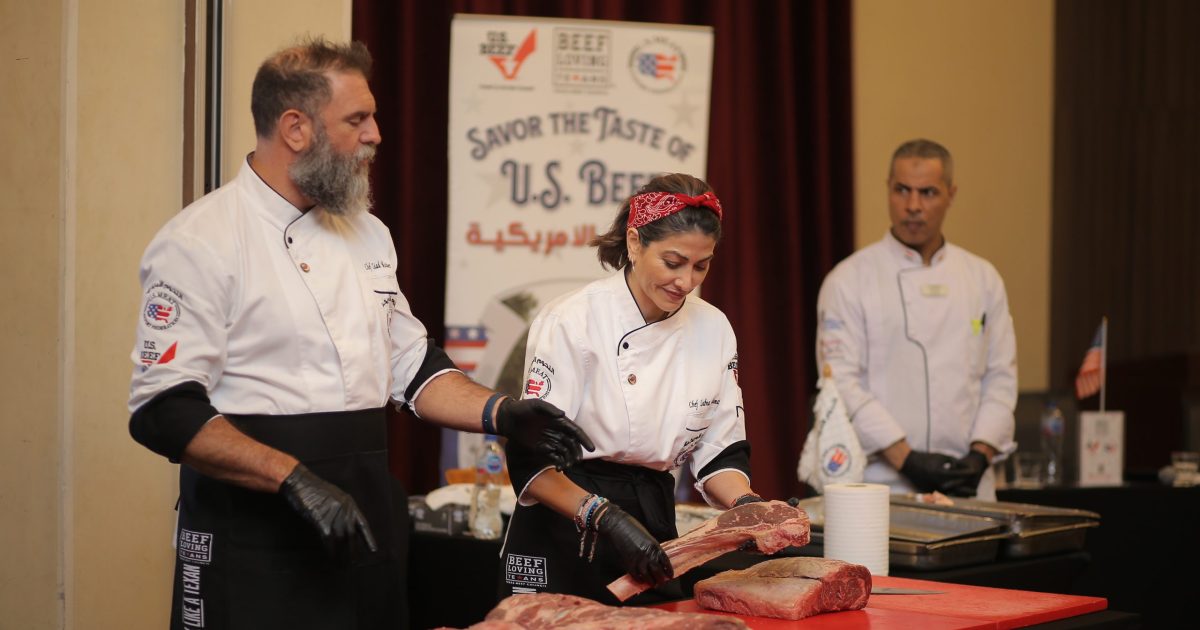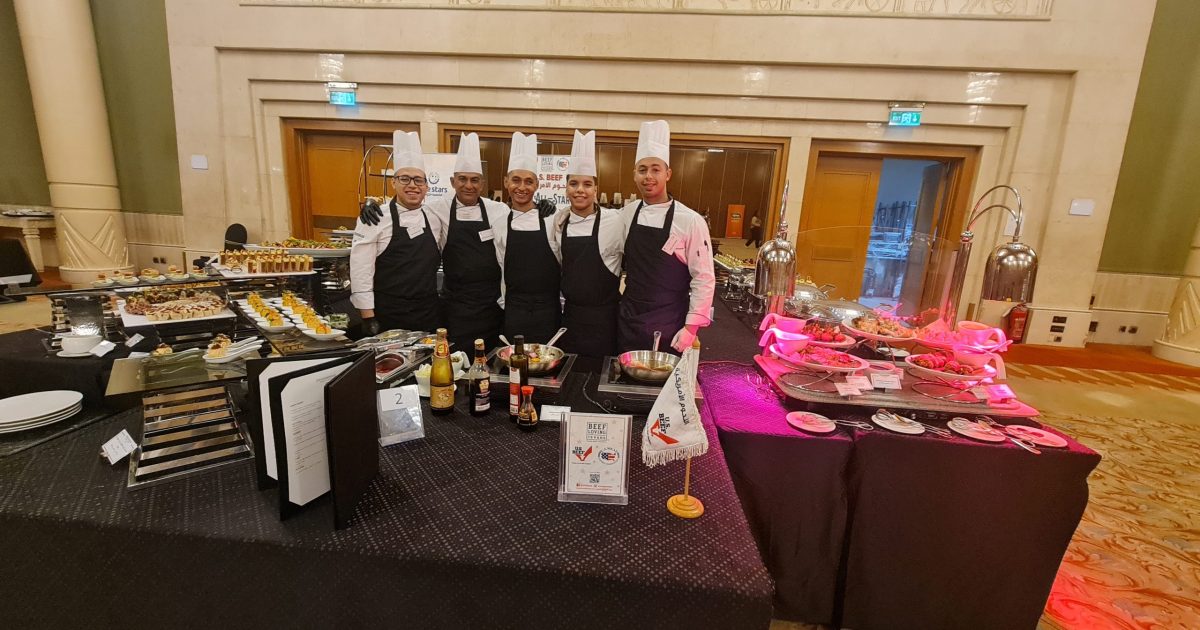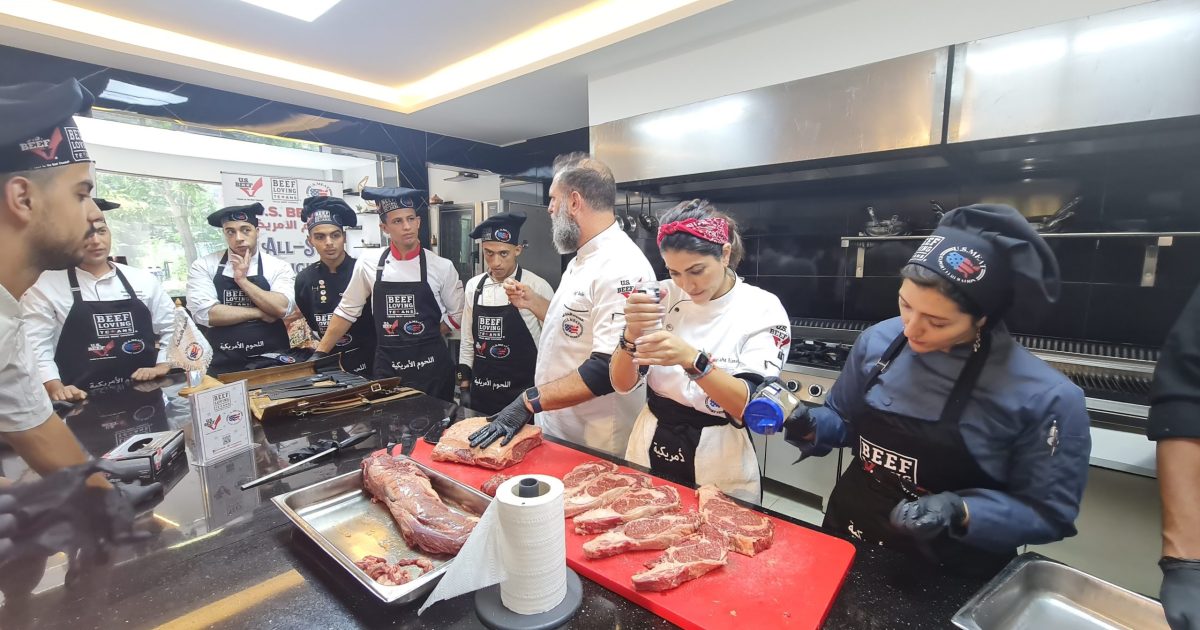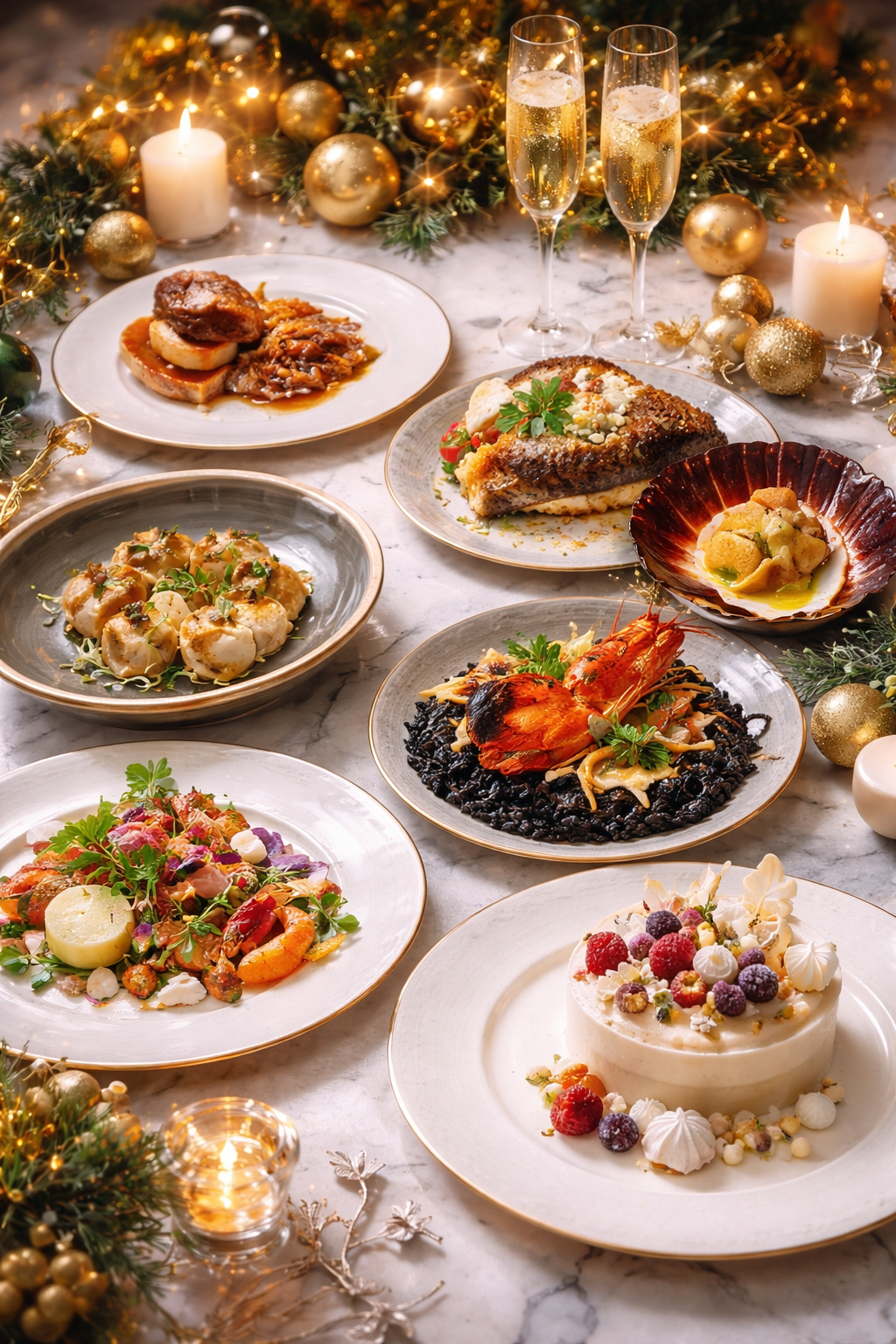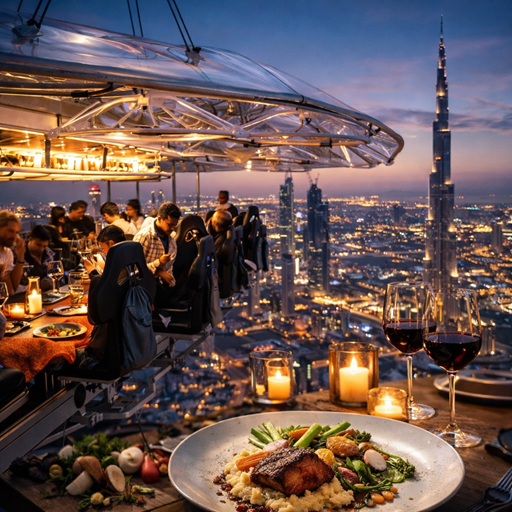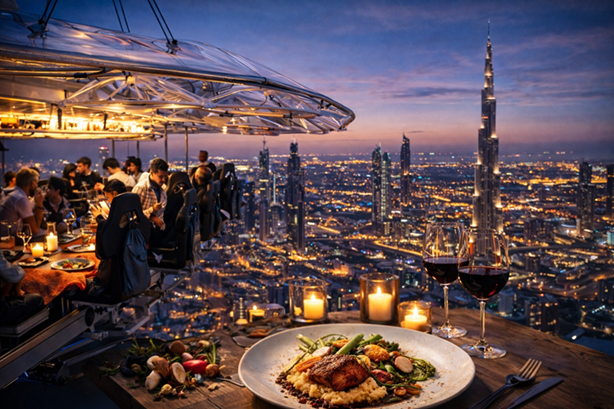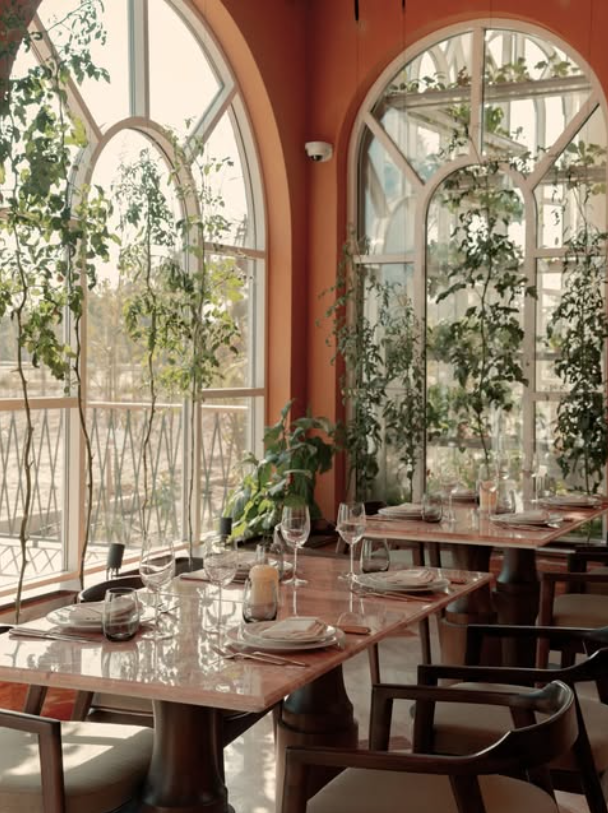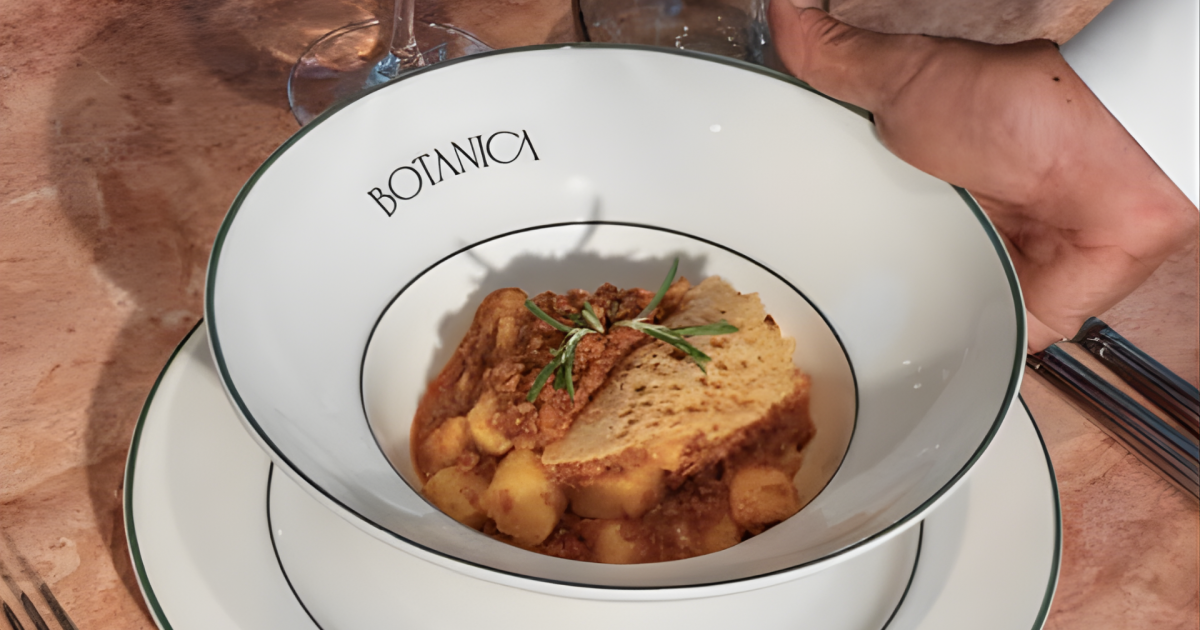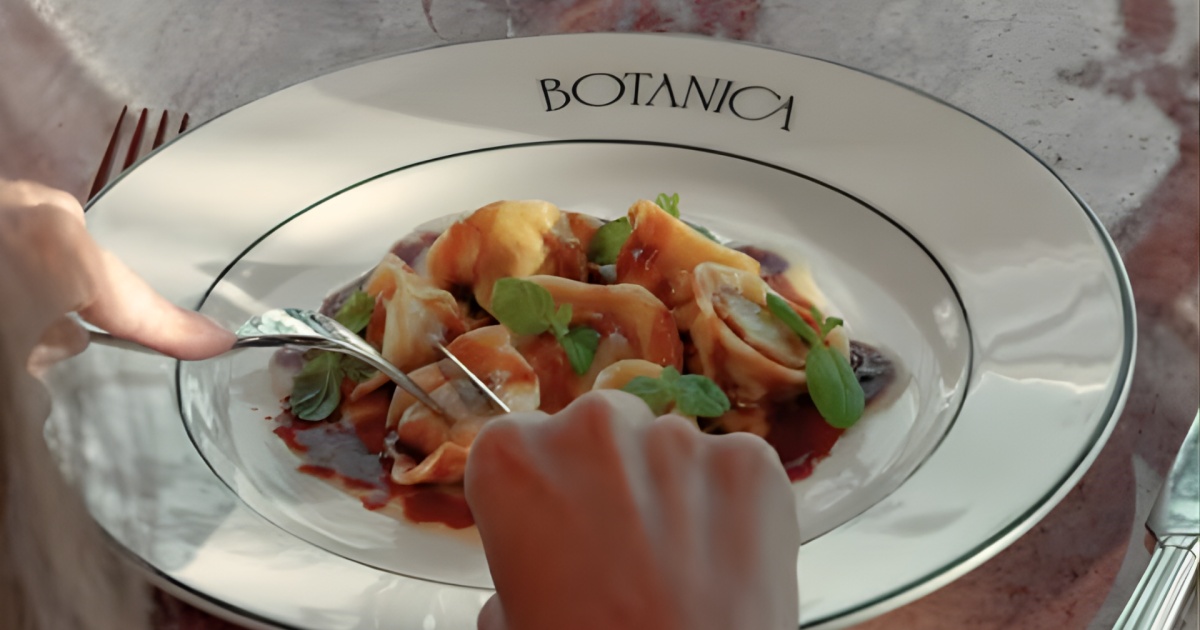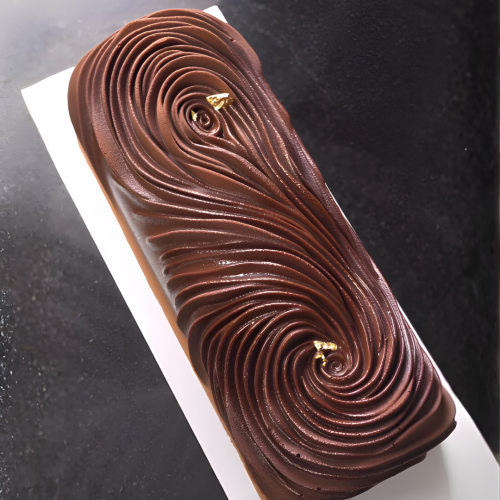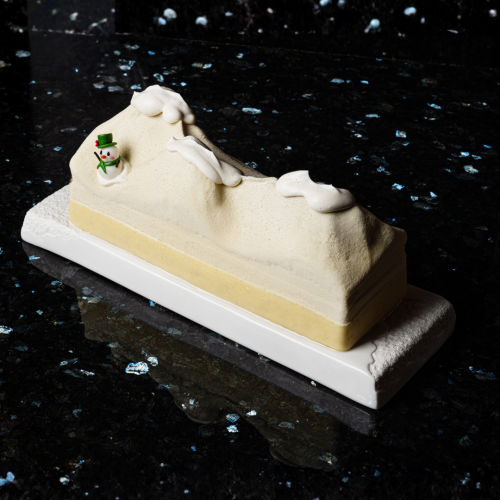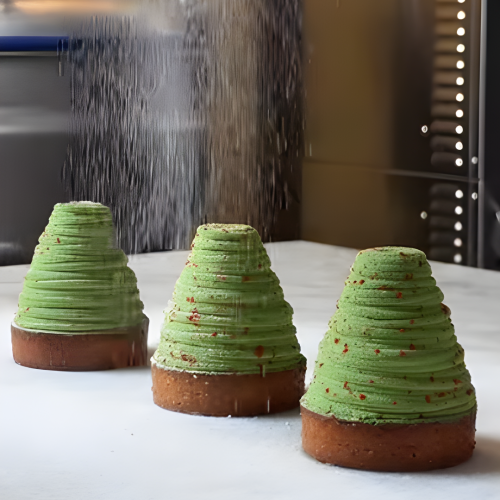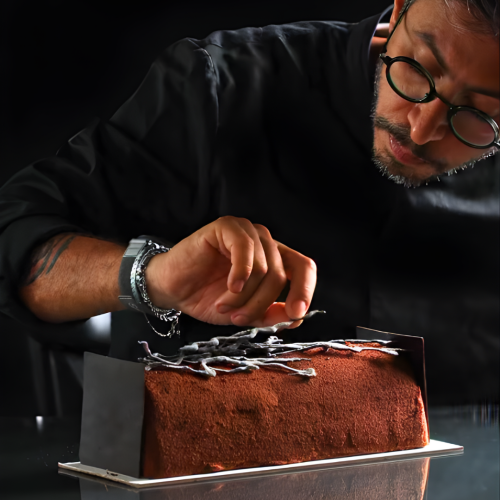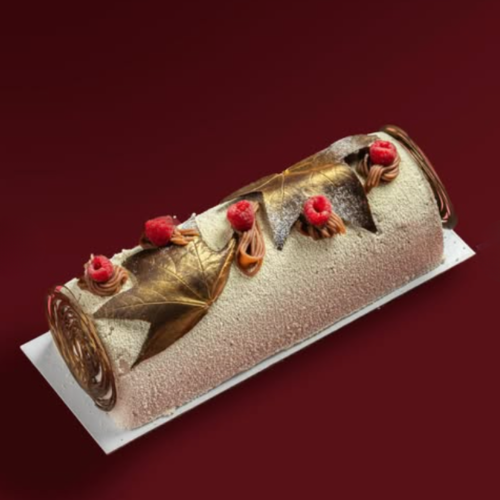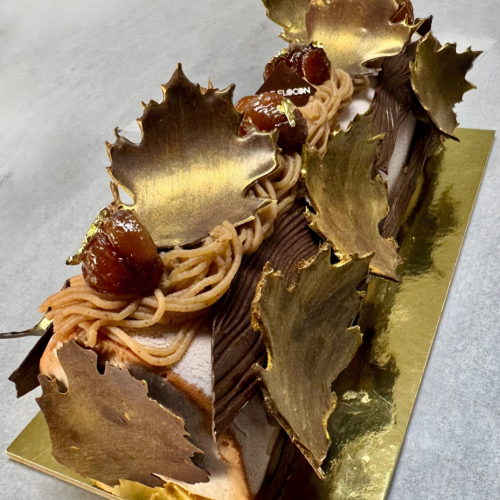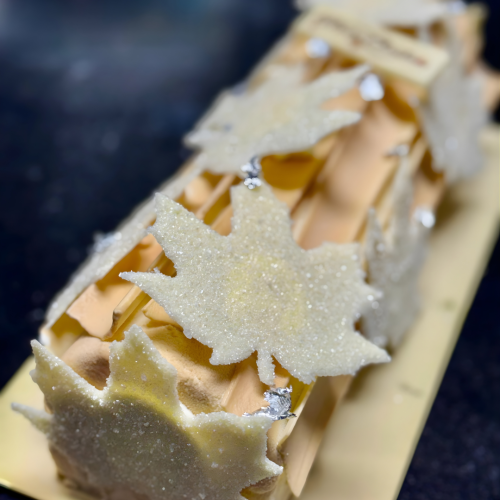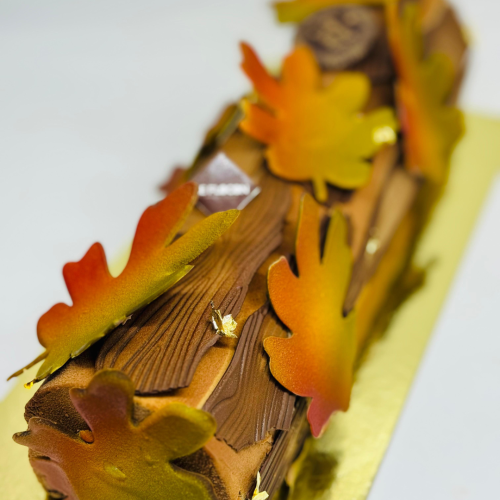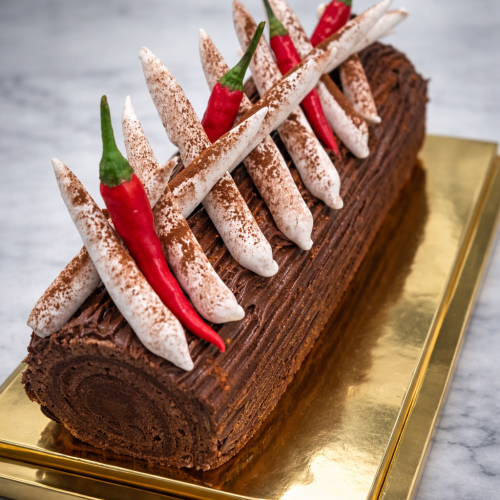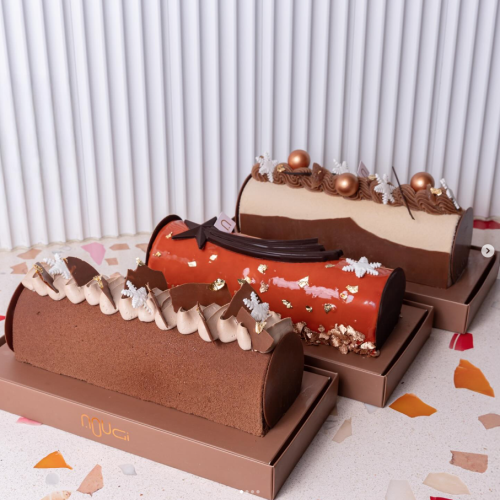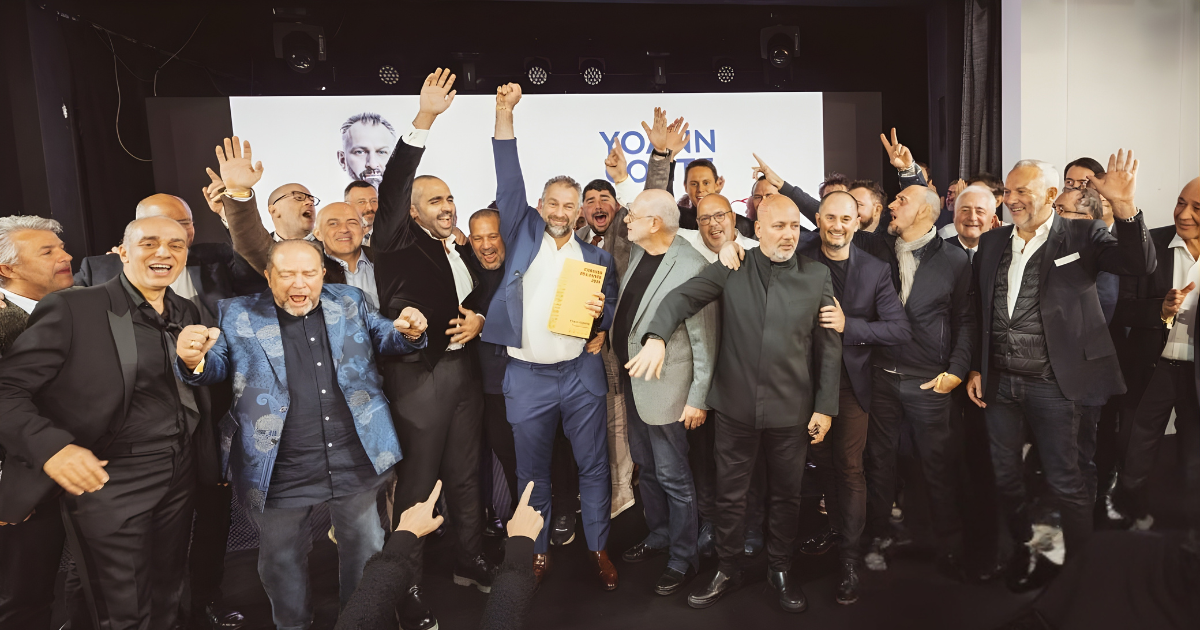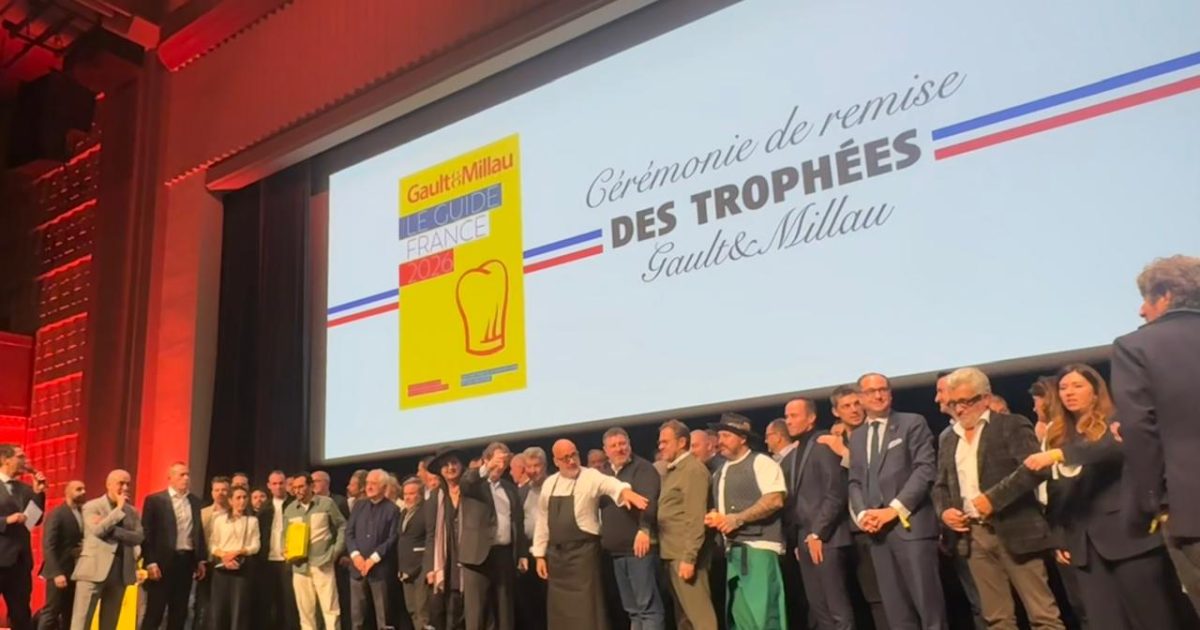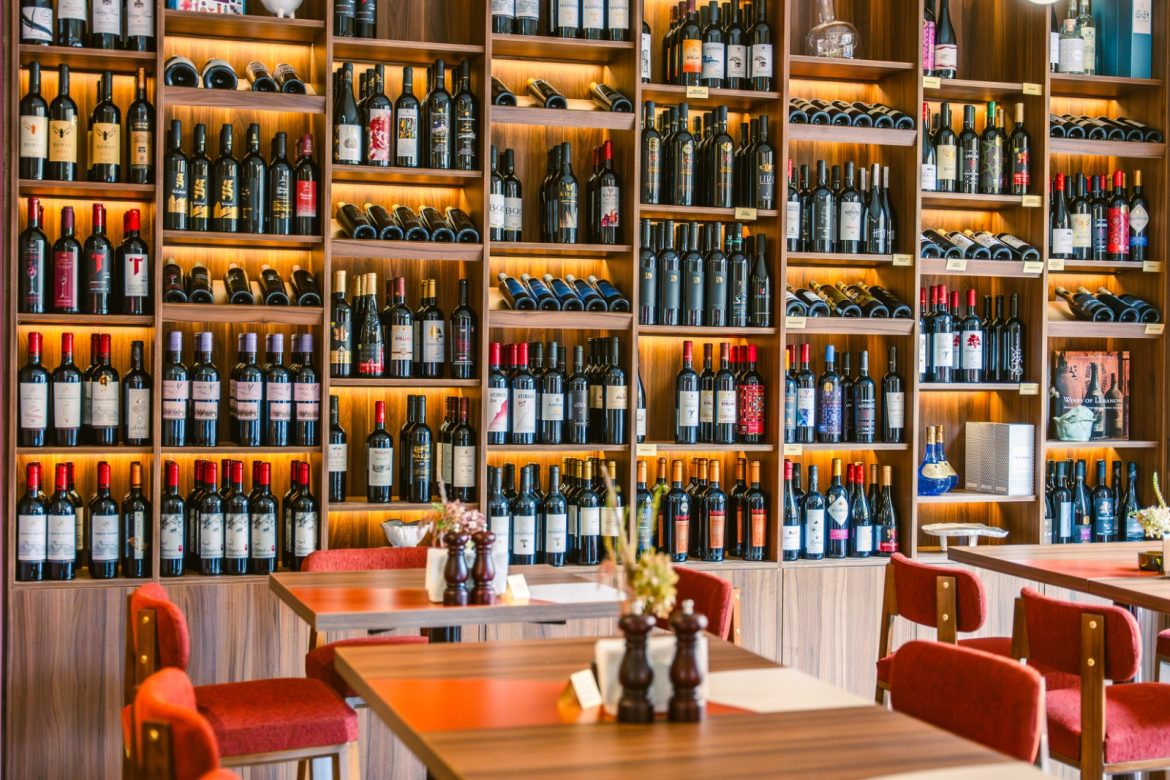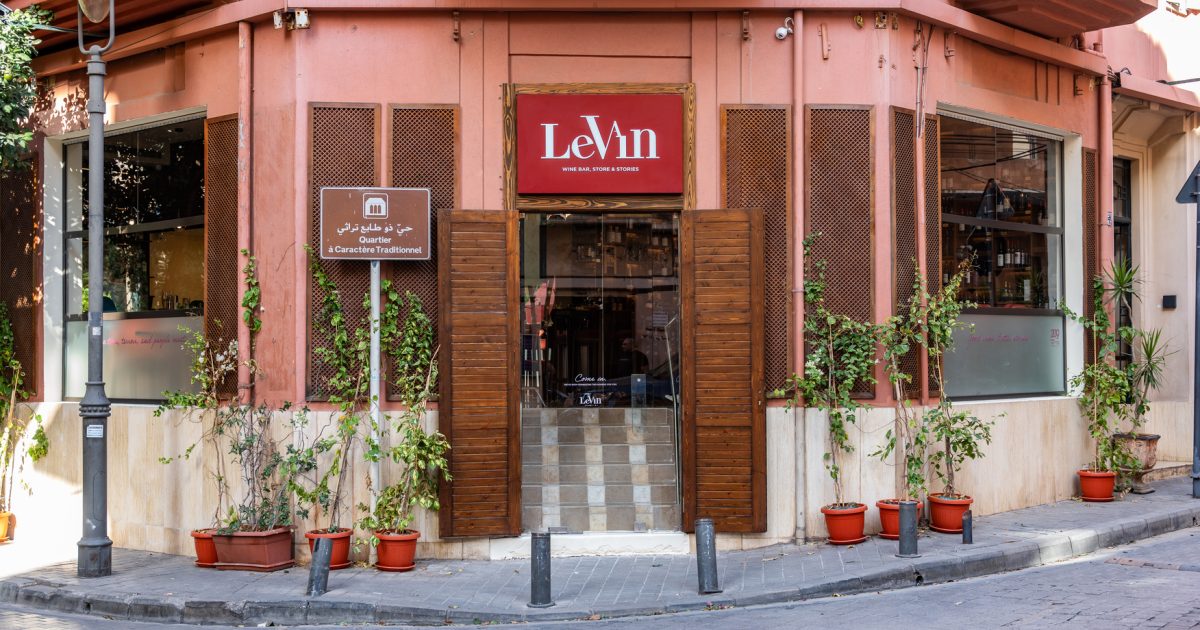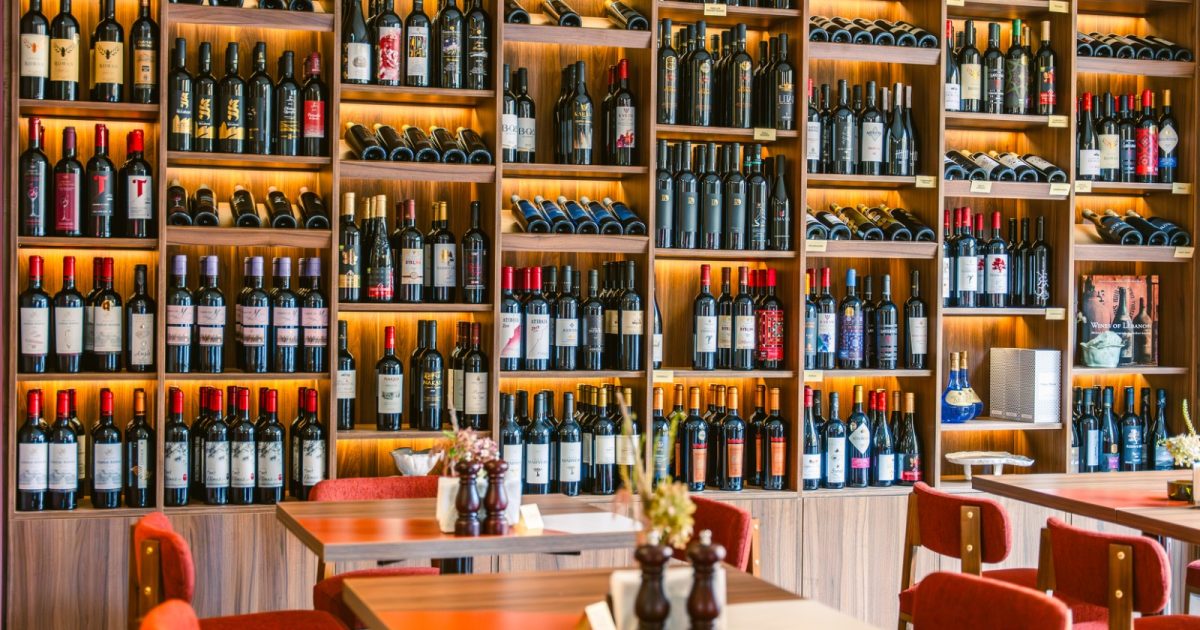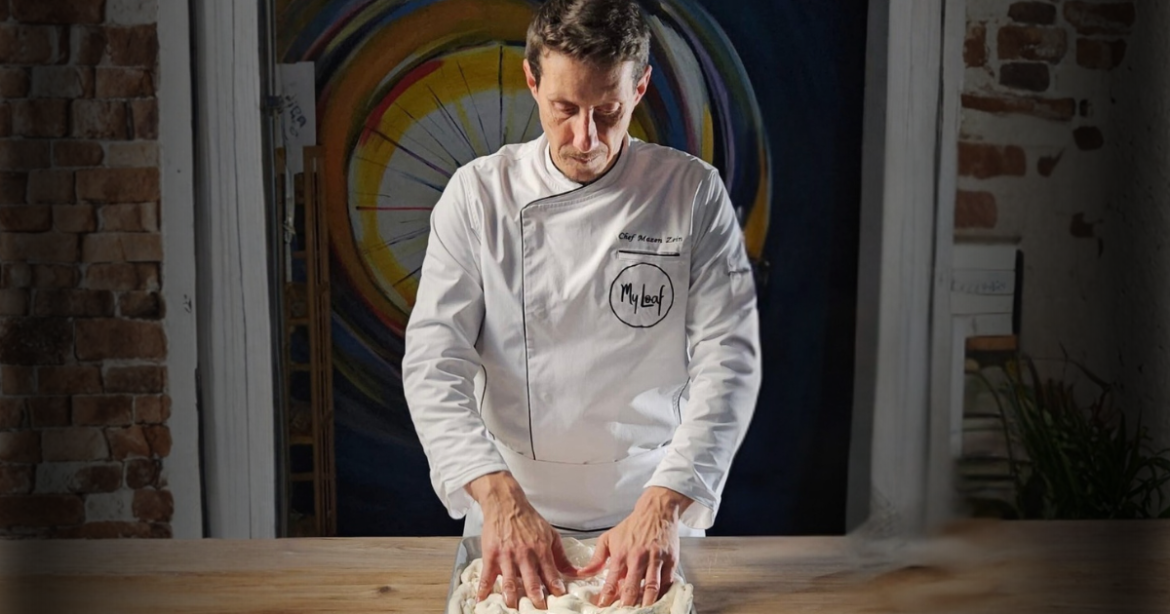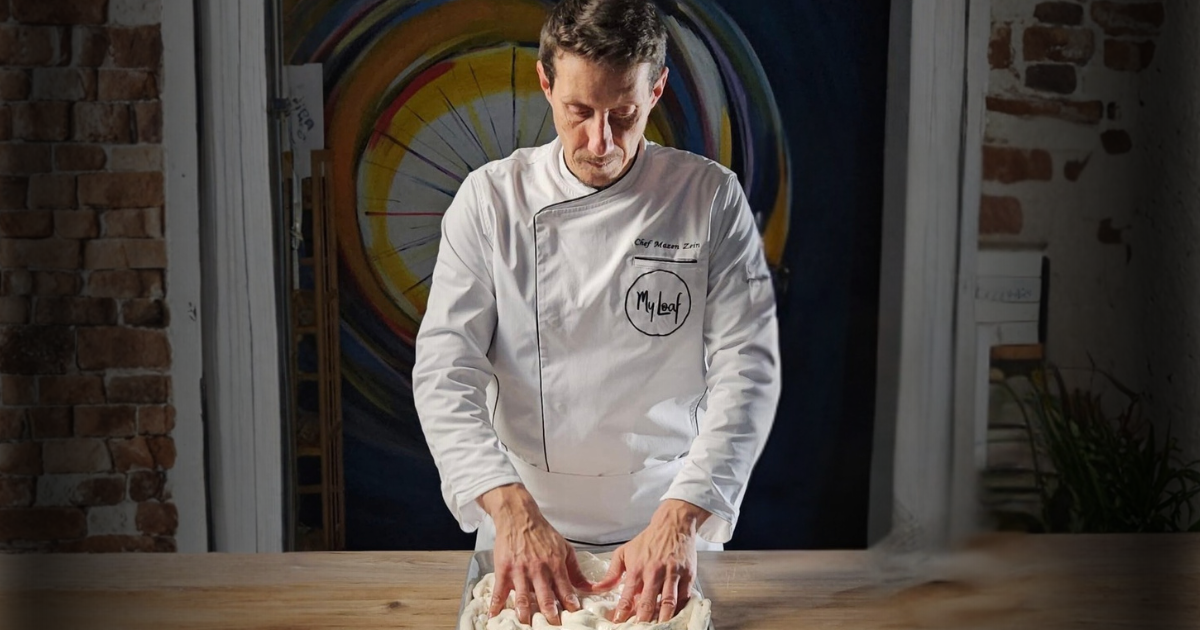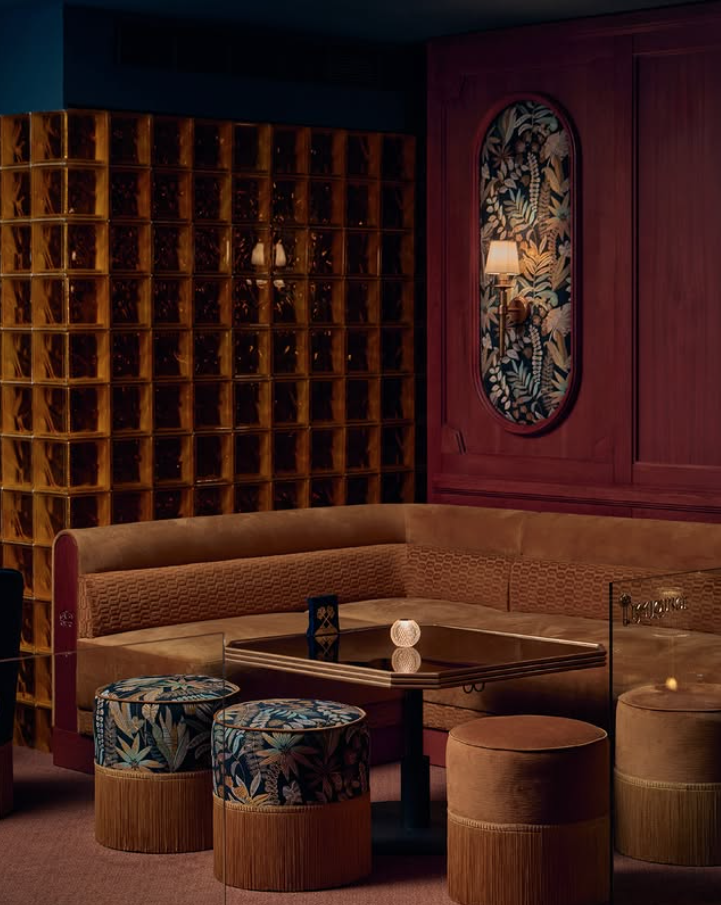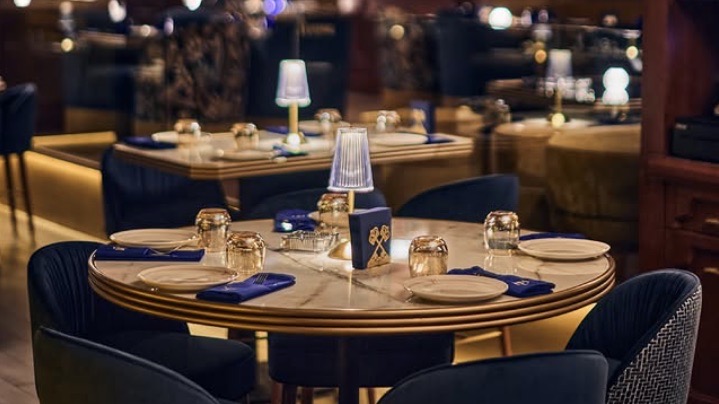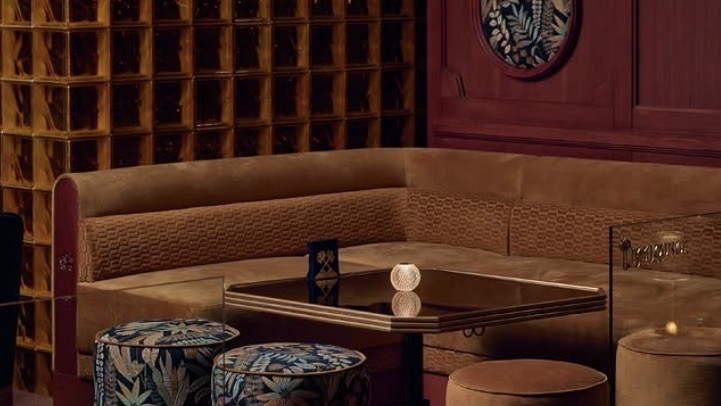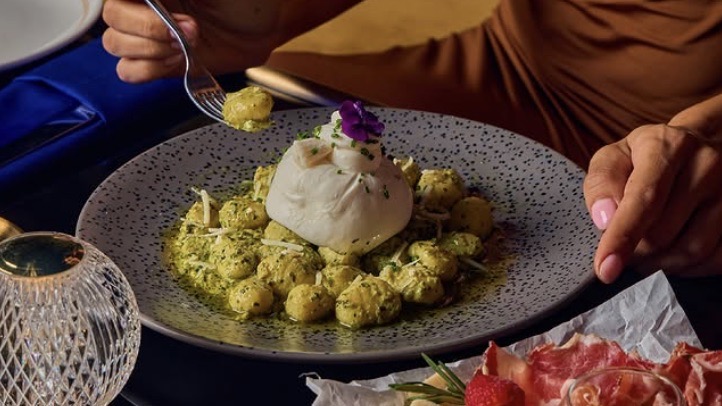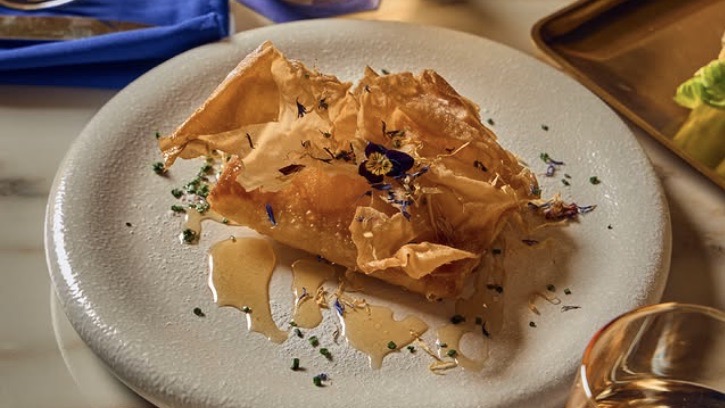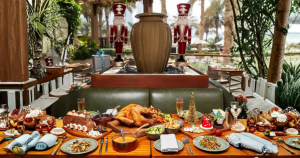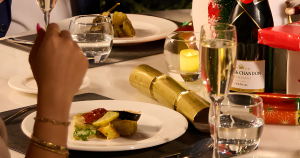WHAT’S NEW |
MULTI-EVENTS U.S. BEEF PROGRAM BUILDS DIVERSE SKILLS AND CULINARY VIBRANCY AMONG EGYPTIAN CHEFS
U.S. Meat Export Federation (USMEF) and the Texas Beef Council (TBC), in partnership with the Egyptian Chefs Association, launched a dynamic multi-event program to bolster Egypt’s burgeoning hospitality industry through technical seminars, hands-on trainings, and competitions.
A culinary voyage commenced at Modern Culinary, where 25 talented young chefs delved into the world of U.S. beef. Through an immersive U.S. beef masterclass and hands-on training, they embarked on an exceptional educational journey.
The adventure continued at the prestigious Steigenberger Hotel, uniting 60 top-tier executive chefs, F&B directors, hotel/restaurant managers, foodservice operators, and traders.
Under the guidance of Head Chef Lubna Alamat and Head Butcher Ziad Muasher, with coordination by USMEF Representative Lina Kanaan, participants immersed themselves in cutting-edge cookery demonstrations and explored diverse scientific and technical topics.
During these enlightening sessions, participants compared tenderloin and striploin, emphasizing the role of ribeye in the grading system. Discussions clarified terminology distinctions, correlated grading with USDA stamps, and addressed packaging differences.
Beyond theory, chefs mastered precise steak portioning and expert reverse-searing techniques. They actively participated in hands-on activities, including trimming and portioning U.S. beef cuts.
Concepts like resting and carry-over cooking were highlighted, along with insights into flank steak’s unique characteristics and the importance of cutting against the grain.
Marinades, dry rubs, and culinary techniques were explored, including smoking briskets and the art of low and slow cooking, showcasing U.S. beef’s versatility, even with lesser-known cuts like braised short ribs.
Upon mastering these culinary applications, participants enjoyed a hands-on carving and tasting session, featuring expertly prepared cuts, from succulent short ribs to perfectly Reverse Seared Ribeye and Striploin Steaks, all served in rich, savory gravy.
This culinary journey received invaluable support from USMEF and TBC, extending to the highly anticipated Hotels’ Buffet Challenge 2023, hosted by the esteemed Egyptian Chefs Association (ECA) at the InterContinental City Stars Hotel.
Renowned chefs from various hotels showcased their talents, with Steigenberger Hotel’s team, led by Chef Hossam Soleiman, claiming the first place.
The grand finale included an unforgettable Award Ceremony, where USMEF and TBC awarded challenge cups, medals, trophies, and custom-made butcher’s knives to winners, recognizing their remarkable achievements.
This partnership with ECA showcased diverse U.S. beef muscle cuts in the Egyptian market, highlighting their quality, taste, and tenderness.
Sponsored by USMEF and TBC, it promises a pivotal role in the success of the Hotels’ Buffet Challenge 2023, marking a significant milestone in Egypt’s culinary landscape.


A CHIC MENU FOR THE LAST DINNER OF THE YEAR
Spending New Year’s Eve at home doesn’t mean compromising on elegance. This carefully curated menu is designed for those who choose to welcome the new year around their own table, with refined flavors that feel festive, comforting, and celebratory. From indulgent foie gras creations to delicate seafood dishes and a graceful sweet finale, each course brings together timeless classics and modern touches—perfect for creating a memorable dinner at home, where taste, balance, and a touch of indulgence set the tone for the year ahead.
FOIE GRAS INSPIRATIONS
-
by Chef Nicolas Herbault
-
By chef Youssef Akiki
-
By Patrick Burat
-
by Chef Alexis Couquelet
-
-
by Chef Stéphane Loison
-
-
by Chef Frederic Chabbert
-
by Chef Franck Page
-
-
by Chef Michel Sarran
-
by Chef Sylvain Arthus
-
by Chef Sylvain Arthus
-
by Chef Sylvain Arthus
-
by Chef Sylvain Arthus
SEA-INSPIRED CREATIONS
-
by Chef Hussein Hadid
-
by Chef Akmal Anuar
-
by Chef Emmanuel Pauliat
-
by Chef Alessandro Salvatico
-
by Chef Rami Jaafar
-
by Mario Jr Haddad
-
-
by Chef Biljana Nava Villarreal
-
by Chef Issam Rhachi
-
by Chef Kyung Soo Moon
-
by Chef Sebastien Fare
-
by Chef Kyung Soo Moon
-
by Chef Faisal
-
by Chef Souheil Ghazal
-
By Chef Youssef Akiki
-
by Chef Joe Barza
-
by Chef Alexis Couquelet
-
by Chef Marc Fontenelle
-
by Chef Hanna Tawil
-
by Chef Ziad Hilal
-
-
-
by Chef Reem Azoury
-
by Tony Kitous
SWEET CREATIONS TO CLOSE THE YEAR
-
by Yasmine Idriss
-
by chef Alexandre Dufeu
NEWS |
THE FOOD TRENDS THAT DEFINED 2025
2025 marked a noticeable shift in the way we eat and experience food. After years of fast-moving, social-media-driven trends, the culinary world slowed down. This was a year defined by intention—where comfort, authenticity, and thoughtful choices shaped both restaurant menus and home kitchens.
Comfort Food, Reimagined
Comfort food returned in 2025, but with a refined edge. Familiar dishes were revisited through better techniques, lighter textures, and a renewed focus on balance. Stews, gratins, purées, and slow-cooked recipes appeared with cleaner flavors and elegant presentation, while desserts leaned into nostalgia without excess.
Comfort was no longer about indulgence—it was about reassurance, warmth, and emotional connection.
Plant-Forward at the Center of the Plate
Plant-forward cooking took a confident step forward. Rather than replacing meat, vegetables became the highlight of the dish. Seasonal produce, legumes, grains, and mushrooms were celebrated for their natural depth and texture, appearing across casual dining and fine gastronomy.
Root-to-stem cooking gained momentum, not only as a sustainable practice but as a creative one. Vegetables were no longer an alternative—they were the main event.
Global Flavors with Meaning
Global flavors remained influential in 2025, but with greater depth and respect. Chefs moved away from superficial fusion, choosing instead to explore regional cuisines through authentic techniques, spices, and ancestral cooking methods.
Menus increasingly told stories—about origins, traditions, and cultural heritage—allowing global inspiration to feel personal rather than performative.
Sustainability as a standard
Sustainability became an unspoken expectation rather than a headline. Smaller menus, local sourcing, and waste-conscious cooking practices were integrated naturally into daily kitchen operations.
Nose-to-tail and root-to-stem approaches gained ground, while seasonality guided menu creation. Responsible cooking in 2025 was quiet, practical, and deeply embedded.
Dining as an experience
Beyond the plate, dining became increasingly experiential. Guests looked for moments rather than meals—atmosphere, storytelling, and connection mattered as much as flavor. Tasting menus, guided pairings, and intimate dining settings transformed meals into shared experiences, reinforcing the idea that dining is about memory-making as much as food.
2025 reminded us that food trends are not just about innovation, but about values. Balance, warmth, and authenticity shaped how we cooked, dined, and gathered—setting a thoughtful tone as we move into a new year.
OUR TAKE ON MONT-BLANC
BY THE TASTE & FLAVORS EDITORIAL TEAM
Serves 4 | Prep. time 45 mins | Baking time 60 mins

INGREDIENTS
For the base
- 4 small crisp meringue nests (store-bought or homemade)
For the chestnut cream
-
250 g sweetened chestnut purée
-
40 g unsalted butter, softened
-
1–2 tbsp milk or cream (to adjust texture)
For the whipped cream
-
200 ml cold heavy cream
-
1 tbsp powdered sugar
-
½ tsp vanilla extract
PREPARATION
-
Prepare the chestnut cream
Mix the chestnut purée with butter until smooth. Add milk or cream gradually until the texture is soft enough to pipe but still holds its shape. -
Whip the cream
Whip the cold cream with powdered sugar and vanilla to soft peaks. Keep chilled. -
Assemble
Place a generous spoon of whipped cream on each meringue nest. -
Pipe the Mont-Blanc
Using a potato ricer or Mont-Blanc piping tip, pipe thin strands of chestnut cream over the whipped cream, forming a dome. -
Finish & chill
Chill for 20–30 minutes before serving. Optional: dust lightly with icing sugar for a snow-like effect.
OTHER RECIPES TO TRY
RESTAURANT IN EGYPT |
BOTANICA
A LUSH CULINARY ESCAPE IN THE HEART OF EL GOUNA
Tucked away within the serene landscape of El Gouna, Botanica is more than a restaurant, it’s a destination designed to slow you down and reconnect you with nature through food, setting, and atmosphere. Surrounded by greenery and infused with a relaxed yet refined energy, Botanica brings a fresh, contemporary approach to dining in one of Egypt’s most sought-after coastal towns.
The space immediately sets the tone. Earthy textures, natural materials, and abundant plant life create a garden-like ambiance that feels both intimate and open. Botanica feels calm without being quiet, elegant without being formal—a place that invites long lunches and unhurried evenings.
At the heart of Botanica lies a menu driven by freshness and balance. Ingredients take center stage, with a strong focus on seasonal produce and clean flavors. Dishes are thoughtfully composed, blending Mediterranean influences with global touches, resulting in plates that feel familiar yet inventive. Botanica’s beverage selection complements the menu seamlessly, offering refreshing cocktails, curated wines, and thoughtfully prepared non-alcoholic options that suit El Gouna’s laid-back lifestyle. Whether it’s a daytime gathering or a sunset dinner, the experience feels tailored to the rhythm of the destination.
What truly sets Botanica apart is its atmosphere, one that encourages connection. It’s a place where conversations linger, where food is enjoyed without rush, and where the surrounding greenery becomes part of the experience. In a town known for its lifestyle-driven offerings, Botanica stands out as a space that feels grounded, intentional, and effortlessly inviting.
Cuisine: Italian cuisine.
Recommended dishes: Galetto Botanica, Catalana style-rock lobster, and delizia al limone .
Address: Red Sea Governorate 1982710, Egypt
20+ CHRISTMAS-THEMED CAKES FROM THE MIDDLE EAST
WE LOVE
With the festive season just days away, Christmas-themed cakes are taking center stage on holiday tables. From classic bûches de Noël to contemporary festive creations, chefs and pâtissiers across the Middle East are reinterpreting seasonal desserts with refined technique and creative flair. Taste & Flavors presents its curated selection of more than 10 standout Christmas-themed cakes from the region, chosen for their craftsmanship and festive spirit.
UAE
KARIM BOURGI
PASTRY CHEF AND OWNER OF KAYU, UAE
The Yule log from Kayu is a festive masterpiece, carefully crafted layer by layer. It combines dark chocolate mousse, milk chocolate cream, salted caramel, gluten-free chocolate cake, and crunchy praline to create a harmony of textures and flavors. Finished with a delicate chocolate spray, each detail is highlighted, making it as visually stunning as it is delicious, a true centerpiece for holiday celebrations.
CHRISTOPHE DEVOILLE
EXECUTIVE PASTRY CHEF, ATLANTIS THE ROYAL, UAE
An architecturally precise festive selection of miniature desserts, blending classic holiday indulgence with contemporary artistry, highlighted by an elegantly glazed chocolate bûche and refined modern pastry creations.
BENOIT DUTREIGE
CORPORATE PASTRY CHEF AT RIKKAS AND PARIS SOCIETY, UAE
This magical Christmas Matrioshka has arrived, each piece is lovingly hand-painted and holds its own festive surprise, offering a charming, heartwarming keepsake that brings the spirit of Christmas into any home.
NICOLAS LAMBERT
SENIOR EXECUTIVE PASTRY CHEF AT FOUR SEASONS RESORT, UAE
Inspired by serene snowscapes, Chef Nicolas Lambert’s seasonal Bûche de Noël is back. This year’s creation, the White Christmas, is visually striking with its soft white finish and an adorable festive snowman figurine. It promises to be a beautiful and refined centerpiece for any holiday table.
ANGELO MUSA
EXECUTIVE CHEF AT THE LANA AND HOTEL PLAZA ATHENEE, UAE
A masterful, festive creation by Chef Angelo Musa, this delicate dessert captures the magic of a snow-covered forest during the holidays.
ABEL VIEILLEVILLE
PASTRY CHEF AT EMIRATES AIRLINE, UAE
This collection is a vibrant and highly refined expression of modern holiday artistry, transforming traditional flavors into sculptural, individual desserts.
LEBANON
PIERRE ABI HAYLA
PASTRY CHEF AND OWNER OF LE NOIR
This year’s Christmas collection at Le Noir has arrived, featuring one chocolate sculptured tree with three indulgent creations crafted for festive indulgence: a bold Dark Chocolate Whiskey bûche, a refined Marrons & Red Fruits Cognac pairing, and a silky-smooth Chocolate Trio masterpiece. Celebrate the season with flavors that are rich, elegant, and unmistakably Le Noir.
CHARLES AZAR
PASTRY CHEF AND OWNER FLOCON
La Châtaigneraie: Chestnut and whisky ice cream layered with whisky-soaked biscuit and candied chestnut notes.
Bûche “Feuilles de Givre”: Vanilla ice cream and strawberry sorbet on almond dacquoise, coated in white chocolate.
Le Sous-Bois: Dulce de leche and 70% Tanzania chocolate ice creams on crispy puffed-rice biscuit.
Bûche Feuille d’Automne (Gluten-free): 70% dark chocolate mousse and milk chocolate ganache on flourless biscuit and almond dacquoise with praliné crunch.
MAROUN CHEDID
CHEF, RESTAURATEUR & OWNER OF MAROUN CHEDID COOKING ACADEMY
Mafrouket Pistachio Bûche: White chocolate and anis crémeux blend into a delicate, nutty bûche with subtle festive spice.
Christmas Azelia Valrhona – Chocolate & Caramel Bûche: Biscuit Viennois, hazelnut glaze, and Jivara crémeux create a rich, indulgent chocolate-caramel harmony.
Chestnuts Bûche: Chestnut glaze, praliné croquant biscuit, and a touch of single malt whisky evoke warm winter notes.
Almond Biscuit Bûche: Praline mousseline and smooth crémeux layered on tender almond biscuit for a simple, elegant festive treat.
MAYRIG
CHEF & FOUNDER ALINE KAMAKIAN
Dark Chocolate & Pepper Bûche: Intense dark chocolate subtly lifted by pepper, revealing warm, spicy cocoa notes.
White Chocolate & Bitter Orange Bûche: Smooth white chocolate balanced with bright, lightly bitter orange zest for a refined festive touch.
NOUGI
NOURA BARZA FOUNDER & MANAGER
Bûche Choco Tentation: A rich, indulgent bûche with deep cocoa intensity and smooth, comforting textures.
Bûche Marron: A delicate chestnut bûche offering warm, subtly sweet winter notes.
Bûche Étoile Filante: Caramel–chocolate crémeux, caramelized apples, and almond dacquoise in an elegant festive harmony.
OTHER PRODUCTS TO DISCOVER
NEWS |
A NIGHT OF CULINARY DISTINCTION: GAULT&MILLAU SAUDI ARABIA GALA
25 JANUARY 2026
On 25 January 2026, Riyadh will host one of the most anticipated events on the Kingdom’s culinary calendar: the Gault&Millau Saudi Arabia Gala. Designed as an annual cornerstone gathering, the evening will officially launch the Gault&Millau Saudi Arabia brand while honoring the chefs, restaurants, and talents shaping the nation’s dynamic food scene.
Honoring culinary talent across the Kingdom
The gala will spotlight exceptional achievements across Saudi Arabia’s gastronomy sector. Awards will be presented to distinguished chefs, pastry chefs, and promising rising talents whose work reflects excellence, innovation, and dedication. Each honoree will receive official Gault&Millau plaques and trophies, recognizing both established mastery and the next generation of culinary leaders.
Launch of the Gault&Millau Saudi Arabia guide
A major highlight of the evening will be the unveiling and distribution of the official Gault&Millau Saudi Arabia Guide. Featuring a carefully curated selection of the Kingdom’s finest restaurants, the guide sets a new national benchmark for culinary quality and creativity, positioning Saudi Arabia firmly on the global gastronomic stage.
A platform for connection and collaboration
Beyond recognition, the gala is conceived as a meeting point for the industry. Chefs, journalists, influencers, and partners will gather under one roof, fostering dialogue, collaboration, and visibility for Saudi culinary talent within the region and beyond.
A gala dinner showcasing Saudi artistry
The evening will conclude with an exclusive gala dinner prepared by leading chefs. Through refined techniques, local ingredients, and contemporary interpretations, the menu will showcase the richness and evolution of Saudi cuisine to both national and international guests.
RESTAURANT IN LEBANON |
LEVAIN
A Home for Lebanese Wine in the Heart of Beirut
OTHER RECOMMENDED RESTAURANTS IN LEBANON
Artist, painter, sculptor, and baker, Mazen Zein brings a rare creative sensibility to the world of breadmaking. His journey began in Dubai, where he formally studied patisserie before venturing into a self-taught exploration of artisanal bread and sourdough. Today, as the founder of My Loaf, Mazen crafts bread that goes beyond taste, bread that nourishes both body and soul, rooted in authenticity, artistry, and the belief that real bread matters.
What inspired you to start My Loaf, and what is your vision for the brand?
I started My Loaf to share my passion for wholesome, artisanal bread with others. My vision is to build a community around bread that nourishes both the body and the soul. Our slogan, “Eat Real Bread,” reflects our commitment to traditional methods and high-quality ingredients, creating bread that is both delicious and genuinely good for you.
Can you tell us more about the health benefits of sourdough bread, and how My Loaf incorporates these benefits into its products?
Sourdough bread offers many health benefits, including improved nutrient absorption, a lower glycemic index, and the presence of beneficial probiotics. At My Loaf, we use a natural starter culture and longer fermentation times to create bread that is easier to digest and richer in nutrients.
How do you ensure the quality and authenticity of your bread, and what sets My Loaf apart from other bakeries?
We are committed to using premium ingredients, traditional techniques, and genuine passion for baking. Every loaf is made with care and intention. What sets My Loaf apart is our dedication to creating bread that is not only flavorful, but also nourishing and honest.
What makes your bread “healthy,” and how do you cater to customers with specific dietary needs or restrictions
Our bread is made with wholesome ingredients, without additives or preservatives. We also offer a variety of options to meet different dietary needs, including gluten-free and low-carb alternatives.
Can you share some of your favorite products that showcase the benefits of sourdough bread?
Our signature sourdough loaf is a customer favorite. We also offer whole wheat bread, rye bread, and a selection of sourdough-based pastries that highlight the versatility and benefits of sourdough.
What’s next for My Loaf, and how do you see the brand evolving?
We are excited to expand our product range, explore new distribution channels, and continue innovating. While growth is important, we remain committed to our core values of quality, authenticity, and customer satisfaction.
RESTAURANT IN LEBANON |
MADAME
FRENCH PRECISION WITH GLOBAL INFLUENCE
OTHER RECOMMENDED RESTAURANTS IN LEBANON
DUBAI’S MOST LUXURIOUS CHRISTMAS BRUNCHES FOR THIS SEASON
Dubai transforms into a glittering festive playground every December, and Christmas Day 2025 is no exception. This year, the city’s most iconic hotels and high-end dining destinations are rolling out decadent holiday brunches, complete with gourmet roasts, live entertainment, Champagne packages, Santa appearances, and stunning views from beachfront resorts to lavish ballrooms.
FAIRMONT DUBAI
- 1:00 pm – 4:00 am
- Starting from AED 450 per person
FAIRMONT THE PALM
Gather your loved ones and celebrate the joy of Christmas with a delightful Christmas Day Brunch at Flow Kitchen. Enjoy a lavish buffet featuring traditional holiday favorites — from succulent roasted turkey and honey-glazed ham to fresh seafood, global specialties, and an array of festive desserts. The cheerful ambiance is brought to life with live entertainment, a visit from Santa Claus, and activities to keep the little ones smiling. All set against the stunning backdrop of Palm Jumeirah, it’s a perfect way to relax and indulge on this special day.
- 1:00 PM – 4:00 PM
- Starting from AED 450 per person
JUMEIRAH MINA AL SALAM
Delight in a vibrant buffet-style Christmas Brunch at Hanaaya, featuring live cooking stations and enchanting entertainment for all ages.
- 1:00 PM – 4:00 PM
- Indoor Pricing:
- AED 820 per person, with house beverages and champagne
- AED 690 per person, with house beverages and prosecco
- AED 590 per person, with soft beverages
- AED 325 per child, ages four to 11
Outdoor Pricing:
- AED 820 per person, with house beverages and champagne
- AED 325 per child, ages four to 11
JW MARIOTT MARQUIS DUBAI
Bask in Dubai’s warm winter breeze with a festive poolside brunch at Aqua, featuring a lavish outdoor buffet with stunning views of the Burj Khalifa. Savor the season’s flavors, enjoy vibrant entertainment with a live singer and saxophonist, and celebrate Christmas in style under the open sky. Once your table is booked, our team will share a secure link for you to complete payment in advance.
- 1:00 PM – 3:30 PM
- AED 395 – Soft Beverage Package
- AED 495 – House Beverage Package A
- ED 695 – Sparkling Brunch (includes premium bubbles & Champagne)
- Children aged 6–12 years: AED 195
- Children 0-5 years are free of charge
PULLMAN DUBAI JUMEIRAH LAKE TOWERS
Festive Christmas Day brunch on 25 Dec 2025: buffet with traditional roasts, holiday mains, desserts, live cooking stations, holiday-themed décor, and festive atmosphere with music and decorations. In addition, there will be festive touches throughout the afternoon, from themed décor to cheerful service, to ensure that every guest feels the joy of the season.
- 12:00 PM – 4:00 PM at Seasons Restaurant, 1st Floor
- Starting from AED 149 per person
MARIOTT RESORT PALM JUMEIRAH
Celebrate Christmas in style with their Levantera Christmas Brunch, featuring a lavish buffet, interactive treats, and a live band. Dine al fresco in our enchanting gardens and savor succulent roast turkey with all the trimmings, rib-eye on the bone and roast leg of lamb. Adventurous palates will delight in our outdoor grill stations with kebabs from the Levant, seafood from around the Gulf, and classic French Bouillabaisse. Throughout the gardens, discover a series of pop-up bars serving signature cocktails and festive favorites, elevating the afternoon into a true celebration. Children can enjoy a dedicated kids’ area with their own buffet and festive activities—and keep an eye out for a surprise visit from Santa himself.
- 1:30 PM – 5:00 PM
- AED 499 (buffet + soft beverages)
- AED 599 (house beverages)
- AED 799 (house beverages + champagne)
- Children 6–11: AED 249
- Children 3–5: AED 99
NH COLLECTION DUBAI THE PALM
Their Maiora Restaurant invites you to an enchanting Christmas Buffet Brunch. Santa’s jovial presence and an array of sumptuous culinary offerings will make this experience one to remember.
- 12:30 PM – 3:30 PM
- AED 275 per person for food and soft beverages
- AED 180 per person, additional for house beverages
- Children aged 6-11 years will be charged 50% of the adult rate. For children aged 12 and above, the adult rate applies.
- Children aged 0-5 years are free of charge.


